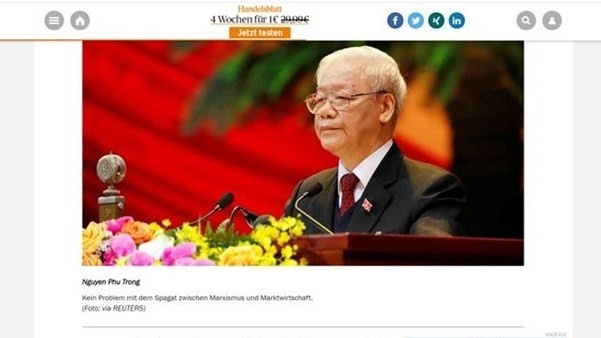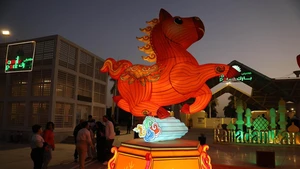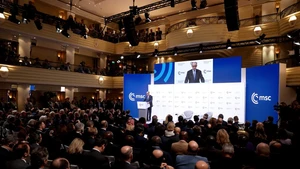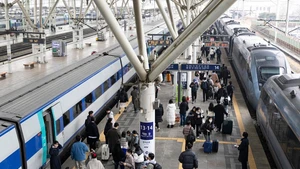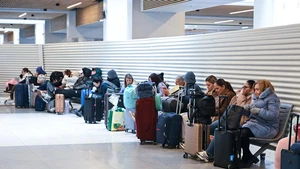The Handelsblatt (Commerce) newspaper wrote on January 27 that under the CPV’s leadership, Vietnam has emerged as one of the most successful countries in Asia in terms of economic development and COVID-19 control.
The article quoted CPV General Secretary and State President Nguyen Phu Trong as addressing the 13th National Party Congress that the central achievement of the country of nearly 100 million in the COVID-19 fight helped to bring the pandemic under control.
Vietnam’s economy has quickly recovered and grown while most other countries in the region have experienced recession. Official data shows its GDP increased 2.91% in 2020 and the country expects average annual growth of 7% between now and 2025 and to become a prosperous industrial nation in the next 25 years.
Over recent years, Vietnam has established itself as a central component of global supply chains, Handelsblatt noted, adding that it previously exported mostly footwear and textiles and garments but now ships smartphones and computers abroad.
The country considers globalisation a major opportunity. It has signed a free trade agreement with the EU (EVFTA) and is one of the founding members of the Comprehensive and Progressive Agreement for Trans-Pacific Partnership (CPTPP) and also a signatory to the Regional Comprehensive Economic Partnership (RCEP) deal, it noted.
Covering the opening of the congress, the Die Welt (The World) newspaper wrote on January 26 that opportunities for investors in Vietnam have yet to be fully tapped.
The once-in-five-years congress will elect a new leadership, honour the accomplishments of recent years, and set new targets for the country.
Vietnam has secured a win in the COVID-19 fight, it said, and has been doing a good job in this regard, even outperforming countries considered good examples of pandemic control.
It is also taking the lead in growth and, in the coming years, may become a new economic centre in Asia and a popular destination for investors, Die Welt wrote.
It can’t be denied that Vietnam’s economy has developed rapidly over many years and is currently recovering quite well after posting growth of 2.91 percent in 2020, the paper said, citing the International Monetary Fund (IMF) as assessing that Vietnam climbed to the fourth position in terms of economy in ASEAN last year, higher than Singapore and Malaysia, and that if growth is sustained it will soon outpace the Philippines and Thailand.
The 13th National Congress marks the strong development of the Communist Party of Vietnam (CPV), affirmed Pathet Lao newspaper of the Lao News Agency (KPL) in a front-page article on January 28.
The article said the Congress is an important transition step, creating the prerequisite for following tenures to successfully implement the national development strategy to 2030, with a view to 2045.
After 35 years of implementing the “Doi Moi” (Renewal) process and 30 years of implementing the Platform on National Construction in the period of transition to socialism, the theory on Doi Moi, socialism and the path to socialism in Vietnam has gradually been perfected translated into reality, the article continued.
It spoke highly of economic accomplishments of Vietnam from 2016 to 2019, noting that the country’s economy still expanded 2.91 percent in 2020 while COVID-19 was put under control.
At the same time, Vietnam’s foreign relations and international integration continue to achieve significant results. In particular, Vietnam has excellently fulfilled its role as Chair of the Association of Southeast Asian Nations (ASEAN) in 2020 and is working actively as non-permanent member of the United Nations Security Council for the 2021-21 term.
The newspaper voiced its belief that under the wise, correct and innovative leadership of the CPV, the 13th National Party Congress will be a success, and the CPV will continue to lead the entire Vietnamese army and people to achieve all goals set to build a prosperous, strong Vietnam with fair and civilised society for the well-being of the people.
The article concluded by stressing that after many decades full of challenges, the great friendship, special solidarity and comprehensive cooperation between the Lao People’s Revolutionary Party and the CPV have been well preserved and are continuing to develop in a practical and effective manner in all areas, bringing real benefits to the people of the two countries, for peace, stability, cooperation and development in the region and the world.
The Straits Times of Singapore on January 28 ran an article that views 2021 as a year of opportunity for Vietnam while the Australian Financial Review (AFR) said Vietnam has become an essential cog in the global supply chains.
The Straits Times wrote that the ongoing 13th National Congress of the Communist Party of Vietnam is to pick new leaders and chart its next course with a strong tailwind from its recent successes.
It said in his opening speech of the congress on January 26, Party General Secretary Nguyen Phu Trong hailed the country's economic development and its containment of the COVID-19 pandemic as twin major achievements. Southeast Asia's rising star does have bragging rights, the paper noted.
This year can be Vietnam's breakout moment after having controlled the COVID-19 pandemic ahead of economies in the region. It can steal a march on the others, as it is probably already doing, taking up the slack as factories in the region stay shuttered while demand for tech, medical and other products surge.
The new leaders it selects and the new course it sets will determine how well it does this and what role it can carve for itself in the region, according to The Straits Times.
In addition, the newspaper added, it is also mindful of the domestic challenges and external uncertainties that could thwart its ambition to become an upper-middle-income country by 2025 and an industrialised economy by 2030.
The article cited Party General Secretary Nguyen Phu Trong as admitting that there are shortcomings, including an economy that is not yet highly resilient. While Vietnam has privatised many state-owned firms, which make up nearly a third of economic output, are low in efficiency and account for many bad loans. The economy remains dominated by low-end assembly work rather than high-end manufacturing. The outdated higher education system also cannot turn out enough highly skilled workers.
In its article on the 13th National Party Congress, the AFR said domestic tourism and everyday life are largely back to normal.
It noted Vietnam’s leaders are focused on attracting more foreign investment as the country has become an essential cog in the global supply chains.
Low labour costs and negligible barriers to entry that initially attracted multinationals such as Unilever and Pepsico in the 1990s and early 2000s remain a drawcard. More recently, electronic giants such as Apple-supplier Foxconn have become keen for opening manufacturing establishments here.
The article added that the World Bank describes Vietnam as one of the most dynamic emerging countries in East Asia.
The AFR also quoted Francis Wong, senior adviser to the Australia-Vietnam Business Council, as saying that one of the keys to successful economic policies for Vietnam is stable and predictable succession in the government that’s driving the push towards an open economy, and that this creates confidence for investors both within the country and foreigners.
The Diplomatic Society, a newspaper with printed and online versions popular in the diplomatic and political communities of South Africa, on January 28 published an article highly valuing 35 years of Vietnam’s innovative development under the leadership of the Communist Party of Vietnam (CPV).
According to this article, the acknowledgment that the people are at the heart of the developmental success of Vietnam’s emergence is the basis of the CPV’s 13th National Congress. The grand opening of the congress in Hanoi on January 26 was attended by 1,587 delegates who represent more than 5.1 million members. The delegates will reflect on the outcomes of the policy of Doi Moi (renewal), which transformed the country to follow the path of a socialist-orientated market economy.
It noted that 2020 can be considered the most challenging year in the build-up to the 13th National Congress.
As the viral COVID-19 pandemic spread across the world it has caused many deaths and affected the health of many more. Further, it has affected human activity, and in some instances, brought it to a complete standstill. Vietnam’s response to the pandemic has been exemplary and commended by the World Bank for acting with urgency to reduce the spread of the virus and minimising deaths and illness caused by the virus even though it shares a border with China, where the virus was first discovered.
Economic growth in Vietnam was calculated at 2.91 percent, the second highest in the world even as the disease sent other advanced economies into a tailspin with many registering negative double digit growth figures. This can be attributed to the governance of the Party and the will, discipline and resilience of the Vietnamese people and their trust in the leadership, The Diplomatic Society wrote.
The International Monetary Fund (IMF) projection for Vietnam’s rate of growth for 2021 is 6.7 percent and per capita income is set to increase to 2,900 USD. Through synchronising infrastructure, industrialisation and modernisation, and combining production with the market, Vietnamese manufactured goods can be found in over 200 countries and regions around the world.
The role of the CPV in extending, increasing international relations, and developing new partnerships through various bilateral and multilateral forums has boosted the country’s global geo-political status, the newspaper went on.
Vietnam has been ranked among the top 10 fastest growing countries in the world over the past five years and is one of the 16 most successful emerging economies. In 2020, the opening up of the Vietnamese economy has resulted in the creation of more than 8 million new jobs and average income increased by nearly 145 percent. Vietnam is also recognised as becoming a “manufacturing hub” in the Asia-Pacific region as it takes the fourth spot in economic size in Southeast Asia.
The CPV’s 13th National Congress will lay out a framework and direction for Vietnam’s development over the next five years, and the new elected leadership will have to implement the decisions taken. Key to this is the 3,260km coastline that has 44 sea ports to drive Vietnam’s path to develop into a significant maritime nation by 2030.
Concluding the article, The Diplomatic Society noted as self-reliance as a nation becomes central to its wellbeing, it also resonates with the self-sufficiency of individual citizens. Changing consumption habits, diversity in connection, communication and information access is leading to integrated monetary exchange mechanisms and the creation of innovative revenue streams generated from enterprising digital platforms and applications. This is well noted in reports and bodes well for Vietnam’s preparedness for the new industrial revolution.
